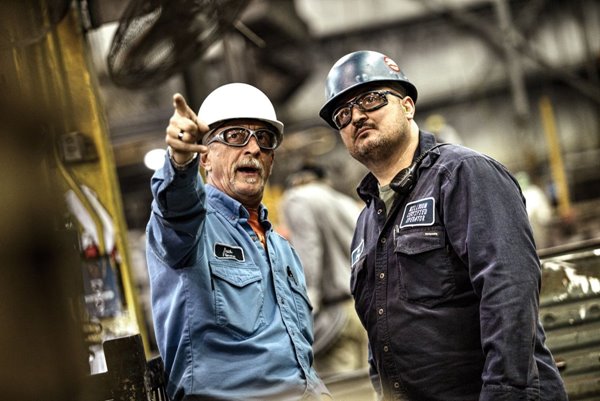Waupaca Foundry Plays Large Role in Local Economy
Mike Pare | Chattanooga Times Free PressAuto sales are set for their best year since 2007, and factories such as the Waupaca Foundry plant in Etowah, Tennessee are riding the surge.
After idling the plant in early 2010 during the Great Recession and then restarting it in mid-2011, the Waupaca factory has ramped up to 432 employees now and more hiring is expected through the end of 2013.
"We’ve bounced back strong,” says Sam Greene, the plant’s manager.
Greene says the company spent about $38 million expanding the plant and getting it back up to speed producing iron castings for brake rotors, drums, calipers and differential cases for autos and trucks.
Located in North Etowah Industrial Park just off U.S. Highway 411 about 65 miles northeast of Chattanooga, the plant is part of a company that bills itself as the largest iron castings producer worldwide with six plants in the United States.
Sara Baumgart Timm, a marketing analyst for Wisconsin-based Waupaca Foundry, quips that “if it stops something, there’s a good chance it comes from [Waupaca].”
The sprawling, dark gray Etowah plant’s production is about a 50/50 split between castings for light cars and trucks and commercial vehicles such as tractor-trailers.
INSIDE, the foundry is a complex hive of people, robots, and assembly lines amid the white-hot melting of scrap iron and pouring of molten metal to make new castings.
Greene said the plant has about three days’ worth of scrap iron on hand at any one time as its raw material.
“We move a lot of metal by truck and rail,” he says.
Greene says the plant operates 24 hours a day for 12 days, and it’s then shut down for two for maintenance. He estimates the plant produces roughly 150,000 pieces a day.
The U.S. auto industry’s outlook is as bright today as it has been since 2008, figures show. Experts say sales of new cars and trucks could reach 15.5 million in 2013, which is the highest level since the severe economic downturn crushed the American economy.
From January through May, automakers and parts companies hired 8,000 workers. While that’s a relatively slow rate, the pace is picking up. The Center for Automotive Research expects the industry to add 35,000 over the full year, according to The Associated Press.
Chrysler Group LLC, Honda Motor Co.,
General Motors Co., Mercedes-Benz and
Ford Motor Co. plan to add more than 13,000 people this year. In addition, large parts companies such as Lear, BorgWarner Inc. and TRW Automotive Holdings Corp. are hiring at factories and research centers.
WAUPACA’S CUSTOMERS are some of the biggest in the sector, including TRW, John Deere, and Aisin. According to Timms, Waupaca products can be found in vehicles assembled by practically every automaker.
“Not Tesla,” she says about the small, niche carmaker.
Waupaca is owned by New York private equity group KPS Capital Partners LP. In 2012, KPS added to its growing automotive business by buying the U.S. subsidiary of ThyssenKrupp AG, including the East Tennessee foundry. The Etowah foundry was built in 2001.
The company’s production jumped 75 percent from 2009 when Waupaca produced under 800,000 tons to about 1.4 million tons of production last year.
Greene says the Etowah plant can melt 100 tons per hour of gray iron, or 80 tons per hour of ductile iron. In terms of casting capacity, the factory can produce 120,000 tons annually of gray iron and 80,000 tons of ductile.
Greene says the type of iron has to due with rigidity. Ductile iron approaches steel in strength and is useful in drive-train applications such as crankshafts.
Company officials see growing demand for their products. Globally, ductile demand exceeded capacity in 2012. The demand for gray iron is expected to exceed production capacity this year.
At the same time, global competition is increasing from locations such as China and India, Greene says. For Waupaca, that means working smarter and more efficiently, he says.
“It’s a continual improvement effort,” the plant manager says. “You’ve got to keep getting better.”
He says the company essentially does its own training of employees offering what he termed a “Foundry 101 course.” Also, Greene says, it gives workers an opportunity to grow and bid for better jobs so they can come up through the ranks.
Companywide, 9 percent of its employees have 25 or more years of service and 42 percent have put in between 10 and 24 years, according to Waupaca.
Environmentally, the Etowah plant tries to recycle byproducts such as slag and sand rather than landfill them.
Foundry slag, similar to crushed stone and left over from the melting process, is provided to a local utility as backfill for its pipeline installation and repair projects, according to the Waupaca.
Over 600 tons of foundry slag has been kept out of landfills thanks to local utility use, the company said.
Additionally, 150 tons of foundry sand is put to earth-friendly use every month as cattle herd bedding, Waupaca officials said. When it’s time to change the bedding, the fertilizer-rich sand is tilled into the soil to improve farm fields, yielding better grazing lands.

